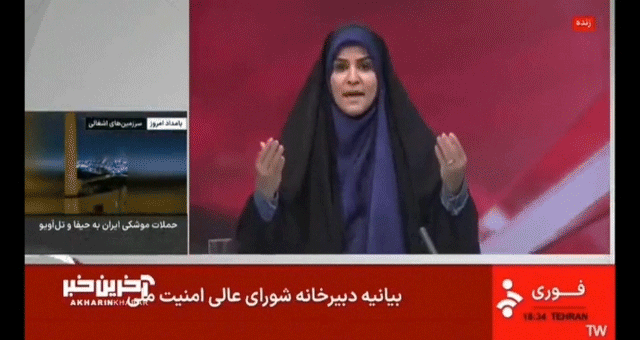In a dramatic escalation of tensions in the Middle East, an Israeli airstrike reportedly struck the building housing Iran’s state-run television network, IRINN, during a live broadcast. The incident occurred on Monday, coinciding with claims from the Israeli military of achieving “aerial superiority” over Tehran. As a result of the strike, the broadcast descended into chaos, highlighting the high-stakes geopolitical conflict unfolding in the region.
| Article Subheadings |
|---|
| 1) Nature of the Airstrike |
| 2) Response from the IDF |
| 3) Broader Implications of the Conflict |
| 4) Civilian Impact and Evacuations |
| 5) Future Prospects for Regional Stability |
Nature of the Airstrike
On Monday, a precise airstrike launched by Israeli forces targeted the IRINN building in Tehran, as it was broadcasting live. The airstrike reportedly filled the studio with dust and chaos, leading to immediate repercussions for the staff and viewers. An on-air reporter described the atmosphere saying it was filled with “the sound of aggression against the homeland,” capturing the panic and disruption caused by the explosion.
The significance of this incident lies in the intent behind the target chosen; the Israeli Defense Forces (IDF) stated that the strike aimed to dismantle communication capabilities that were allegedly utilized for military ends. This operation signifies a substantial escalation in the ongoing military confrontations between Israel and Iran, possibly marking a turning point in the latter’s military strategy.
Response from the IDF
The IDF has issued statements confirming their involvement in the airstrike, emphasizing that it was a “precise strike” carried out based on intelligence from its Intelligence Directorate. The IDF characterized the target as a communication center being exploited by the Iranian Armed Forces under the guise of civilian operation, thus aiming to destroy capabilities linked to military infrastructure.
According to the IDF, the operation was essential in degrading the operational capacity of Iranian military assets, claiming that they have successfully reduced Iranian air defenses to a level where Israeli aircraft can operate over Tehran without substantial threat. The IDF’s narrative suggests that their operations are not only defensive but aimed at dismantling ongoing threats from Iran.
Broader Implications of the Conflict
This incident raises questions about the overall stability in the region, with analysts noting the airstrike as a reflection of escalating military engagements between Israel and Iran. The Israeli military’s claims of aerial superiority suggest a strategic shift that may lead to more aggressive actions against Iranian assets, possibly leading to further retaliatory measures from Iran.
The airstrike against a state-run broadcaster also indicates a new level of confrontation. Such actions might provoke severe diplomatic ramifications, impacting not just bilateral relations but also involving allies in the region. As tensions climb, the adversarial posturing from both sides could potentially spiral into larger conflicts, raising the stakes for countries engaged in mediating peace in the Middle East.
Civilian Impact and Evacuations
Civilians in Tehran were notified ahead of the airstrike, as the IDF issued evacuation warnings, a move that starkly contrasts with the situation in Israel where civilians often do not receive prior warnings before attacks. This aspect of the conflict raises ethical questions about military conduct and civilian safety, especially in densely populated areas like Tehran, where innocent lives could easily be endangered.
The chaotically abrupt transition from live broadcast to prerecorded highlights the immediate dangers posed not only to military personnel but also to civilians who may inadvertently become involved in military actions. As the situation evolves, measures will likely be taken to safeguard civilians, but the unpredictable nature of aerial dynamics continues to pose challenges for all parties involved.
Future Prospects for Regional Stability
In light of these developments, the questions surrounding regional stability take center stage. Will this airstrike compel Iran to alter its military strategy or will it intensify their resolve? As both nations increase military preparedness, the risk of an all-out conflict looms larger.
International observers are wary of the situation evolving into a larger war, which could not only destabilize Iran and Israel but also have rippling effects on global oil markets, diplomatic relations, and international security. Continuous updates on military capabilities, communication strategies, and any retaliatory measures from Iran will be crucial in understanding whether further escalations are imminent.
| No. | Key Points |
|---|---|
| 1 | Israeli airstrike hits IRINN building during live broadcast |
| 2 | IDF confirms the strike aimed at military communication infrastructure |
| 3 | Potential for escalating conflict between Israel and Iran |
| 4 | Civilians evacuated prior to the strike, raising ethical concerns |
| 5 | Future of regional stability remains uncertain amid rising tensions |
Summary
The airstrike on Iran’s state-owned television building marks a significant moment in the ongoing military skirmishes between Israel and Iran. With the IDF asserting its operational dominance, the potential for increased conflict and destabilization in the region cannot be overstated. As international reactions unfold, both nations face a complex web of strategic decisions that could shape the future trajectory of Middle Eastern geopolitics.
Frequently Asked Questions
Question: What was the target of the Israeli airstrike?
The target was the building housing Iran’s state-run television network, IRINN, which was allegedly being used for military communication purposes.
Question: What was the reaction from the Israeli Defense Forces?
The IDF confirmed that the airstrike was conducted as a precise operation based on intelligence, aimed at degrading military communication capabilities related to the Iranian Armed Forces.
Question: How might this incident affect civilian safety in Tehran?
Civilians were warned in advance of the strike, but ongoing military operations represent a significant risk to civilian populations, raising ethical concerns regarding the conduct of warfare in populated areas.


